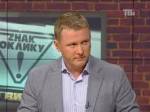Curiouser and curiouser
 In terrorism the Ukrainian way, it is the Security Services who inform the media that they are about to receive a ransom letter. If this seems upside down to the reader, it should. The details emerging thick and fast in the trial underway of four men in connection with bomb blasts in Dnipropetrovsk in April 2012 raise the gravest doubts about the case.
In terrorism the Ukrainian way, it is the Security Services who inform the media that they are about to receive a ransom letter. If this seems upside down to the reader, it should. The details emerging thick and fast in the trial underway of four men in connection with bomb blasts in Dnipropetrovsk in April 2012 raise the gravest doubts about the case. On Thursday well-known television presenter (and briefly Director) of channel TVi, Artem Shevchenko took the witness stand. He explained that in May 2012 he had been phoned by the Security Service [SBU] Press Secretary and invited to the SBU offices. There he was informed that he would be meeting the head of the SBU dealing with the Dnipropetrovsk bombs and that the terrorists were writing him some kind of letter. At the said meeting he was given some details about the investigators’ work in looking for “these people or person. They showed me excerpts in which these people said that they would be approaching television. And I was told that I could soon receive some kind of letter”.
After a conversation lasting several hours with the SBU, Artem Shevchenko did indeed suddenly find an email, purportedly from the “terrorists” addressed personally to him but on the business email address of the channel.
The authors of the said epistle wrote that they were responsible for a series of explosions in Kharkiv, Zaporizhya and Dnipropetrovsk. They suggested that Shevchenko act as go-between in their talks with the authorities. They were demanding, the letter said, 4.5 million dollars.
Shevchenko said in court that after this strange “coincidence” he and his colleagues suspected that the letter was not in fact from the people who had planted the bombs in Dnipropetrovsk, but overt provocation from the Security Service.
The prosecution then asked one of the two men accused of planting the bombs – Vitaly Fedoryak – about this letter. Fedoryak who has said that he is guilty of everything stated that the text of the letter had been written by Viktor Sukachev, but that he had sent it.
However Viktor Sukachev who, according to the investigators, is the key figure in this case denied this.
As reported, over the last week or so it has become clear that something is very strange about the impugned “explosions” in Kharkiv. An envelope with an extortion letter only appeared after the police arrived in response to an explosion It was found, looking remarkably clean and intact on top of the place where the explosive device went off. The second explosion, it transpires, was mentioned for the first time 6 months later.
Fedoryak has confessed to everything, with this presumably including one explosion in Kharkiv (at least) that may not have happened.
Sukachev is the link between all of the accused, two of whom are charged with being “accomplices”. Neither Reva nor Prosvirnin knew Fedoryak, which is yet one more of the details which makes the charges against Dmytro Reva so totally absurd. He is accused of having gone to the centre of Dnipropetrovsk to “observe” the explosions, reaction of the police and public, and “if necessary pass information” to the organizers of the bombs so that they “could take further measures”.
This is not only meaningless because the bombs had already been planted, and as chemical devices there was no way of knowing when a given device would explode. It also ignores the fact that according to the prosecution’s case, the two bombs which Reva happened to be near were planted by Fedoryak who Reva did not know and had no way of contacting.
Sukachev has acknowledged partial guilt but not gone into details. His testimony in court is eagerly awaited but unfortunately only likely in early October.
Sukachev has insisted from the outset that Reva and Prosvirnin have nothing to do with the case and must be released. It is not clear whether he is still on hunger strike in protest at their continued detention. This is the second such protest.
The court has ignored Sukachev’s testimony, and his action (the conditions in Ukrainian SIZO are terrible and it is no small thing to go on hunger strike).
It has shown just as little interest in grave procedural irregularities and the lack of any elements of a crime in the charges against Dmytro Reva. It has now rejected 11 applications for his release despite his detention having been justified on the grounds of a phone call proven to have in fact been made by an SBU officer.
The case is showing every sign of falling apart at shoddily sewn seams which calls for response at very least from the court. This unfortunately has not been forthcoming.
(Halya Coynash)





